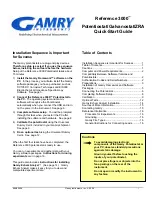
7-12 Sensitivity Tuning Procedure
SRS Residual Gas Analyzer
6. Run a few analog or histogram scans on the sample gas to assure the purity and levels
of the calibration gas.
7. Measure the output signal from the RGA for the principal mass peak of the
calibration gas (i.e. usually the parent molecule peak) using the Faraday cup detector.
Extract the peak value from spectral scans or measure it directly using the single
mass measurement mode of the SRS RGA
8. The ratio of this output signal to the pressure of the gas is the partial pressure
sensitivity factor.
9. The sensitivity factor, in units of mA/Torr, can be saved into the non-volatile
memory of the RGA Head using the SP command. The parameter value saved is
automatically used by RGA Windows as a conversion factor between the ion currents
received form the head and the partial pressure units selected by the user. See the
RGA Command Set listing for details.
Important
: The sensitivity factors calculated in this fashion can only be applied to
situations where the RGA is used with the same operating parameters. Change the
instrument parameter settings to those of your measurements prior to the calibration if
necessary.
A
total pressure sensitivity factor
is also needed by the SRS RGA to convert the ion
currents obtained during total pressure measurements into total pressures. Total pressure
sensitivity factors vary with different gases and share many of the properties of the partial
pressure factors. They are determined by a procedure identical to the one described
above, but with the partial pressure measurements replaced by total pressure
measurements. The total pressure sensitivity factor, in units of mA/Torr, can be saved
into the non-volatile memory of the RGA Head using the ST command. The parameter
value saved is automatically used by RGA Windows as a conversion factor between the
total ion currents received form the head and the pressure units selected by the user. See
the RGA Command Set listing for details.
Note
: The underlying assumption when using sensitivity factors in quantitative
calculations is that there is a linear relation between the pressure and the corresponding
RGA signals of the gases. This assumption is only strictly correct as long as the pressures
in the RGA Head are kept below 10
-5
Torr. Deviations from linearity are to be expected
above that pressure value due to space charge effects in the ionizer and ion-neutral
scattering interactions in the filter. A more thorough check of the RGA’s sensitivity
involves measuring the RGA signals over several orders of magnitude of partial pressure
to determine the range over which a linear relationship exists. The sensitivity factor for
the gas is calculated as the slope of the “signal vs. pressure” response over the linear
range.
RGA Windows
uses the partial pressure and total pressure sensitivity factors stored in
the non-volatile memory of the RGA Head as conversion factors between the ion currents
received from the head and the pressure units selected by the user. A Sensitivity Tuning
command in the Head menu automates the sensitivity tuning procedure described above
and allows the user to recalibrate or change the sensitivity factors very easily. Consult the
RGA Windows Chapter of this manual and the On-line Help Files for details on the
tuning commands of the program.
Summary of Contents for RGA100
Page 4: ...SRS Residual Gas Analyzer iv...
Page 18: ...xviii Command List SRS Residual Gas Analyzer...
Page 46: ...2 14 Residual Gas Analysis Basics SRS Residual Gas Analyzer...
Page 66: ......
Page 78: ...4 12 Mass Filter Power supply SRS Residual Gas Analyzer...
Page 104: ......
Page 107: ...Programming the RGA Head 6 3 SRS Residual Gas Analyzer Error Byte Definitions 6 69...
Page 216: ...8 26 Quadrupole filter cleaning SRS Residual Gas Analyzer...
Page 246: ...11 2 SRS Residual Gas Analyzer...
Page 247: ......
Page 248: ......
Page 268: ...Appendix B SRS Residual Gas Analyzer 7...
Page 312: ...Appendix D SRS Residual Gas Analyzer 27...
















































